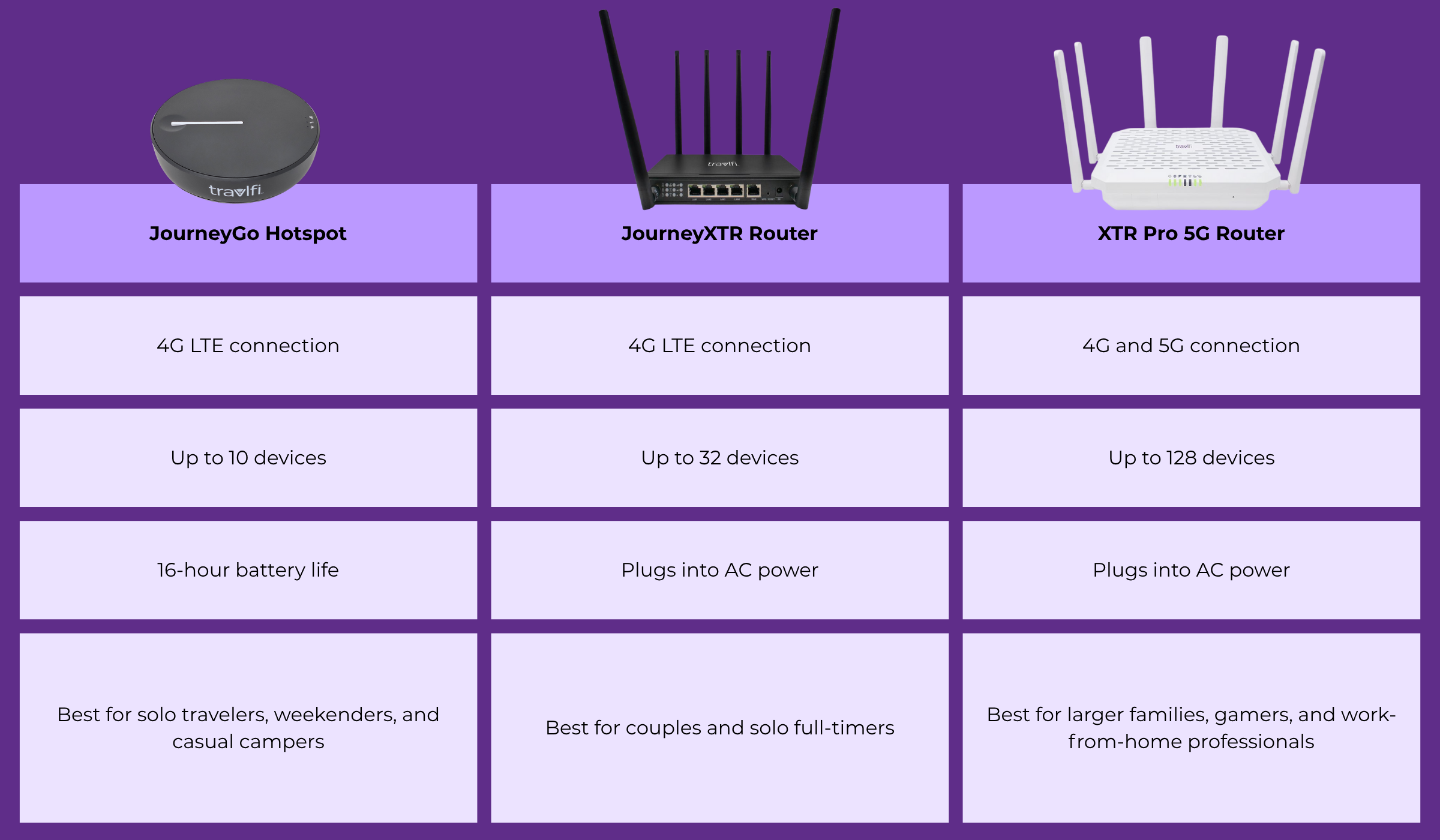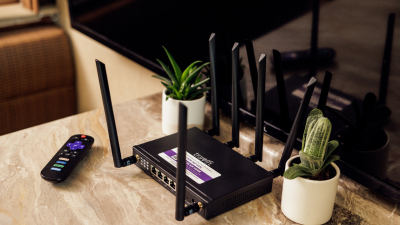
Discover the difference between mobile hotspots and RV WiFi routers, and learn which mobile internet solution is right for you.
Staying connected to who and what you love while traveling the open road can be frustrating—not to mention, shoddy WiFi can get you in trouble at work if you’re trying out that digital nomad life.
While you may be familiar with cellular hotspots by way of your cell phone or an actual mobile hotspot, there’s another way to get RV internet that many travelers aren’t aware of: mobile WiFi routers.
This type of mobile internet solution works much like a mobile hotspot, but is significantly more powerful and typically offers stronger connections, faster speeds, and less latency. For full-time RVers and vanlifers, especially those whose rigs double as a home office, an RV WiFi router is often the best solution for connectivity.
Experts Who Contributed to This Guide
- Amanda Capritto, the author, has traveled full-time for two years and uses multiple RV WiFi systems to support her work as a writer and editor.
- Jeff Gwinnell, TravlFi connectivity specialist, reviewed this piece for accuracy.
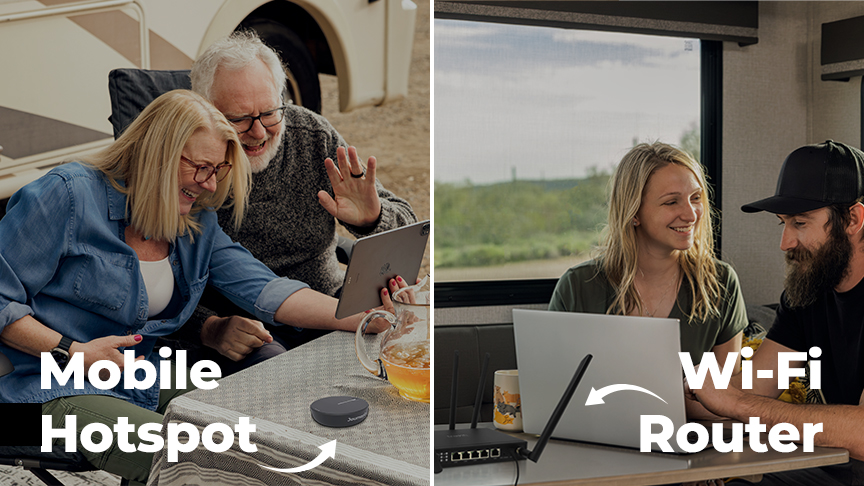
What Is an RV WiFi Router?
An RV WiFi router is a specialized device that allows you to connect multiple devices to the internet from your recreational vehicle (RV). It works similarly to a home router but is designed for mobility, leveraging either cellular networks or local WiFi signals from campgrounds, rest stops, or other hotspots to provide internet access.
RV WiFi routers are ideal for travelers who need consistent, strong internet access across multiple devices, whether for work, streaming, or staying connected with family. Unlike mobile hotspots, which only support a limited number of devices, RV WiFi routers can handle larger networks and are often more powerful in terms of range and speed.
Shop TravlFi RV WiFi routers with 4G and 5G connectivity.
RV WiFi Hotspot vs. RV WiFi Router: What's the Difference?
An RV WiFi hotspot and an RV WiFi router serve similar functions but have key differences. A hotspot is typically a mobile device that uses cellular data to create a small, portable WiFi network.
While it’s convenient, it usually supports fewer devices and may have limited range. Many hotspots only connect to one data provider, although that’s not the case with TravlFi’s hotspots, which access all major network providers at no additional cost.
An RV WiFi router can pick up signals from a variety of sources, including public WiFi and cellular data, and broadcast them to multiple devices over a wider area.
This makes it a more versatile option for long-term travel or situations where several people need to connect to the internet at once. They support stronger connections, which leads to faster internet speeds and a lower risk of a dropped connection.
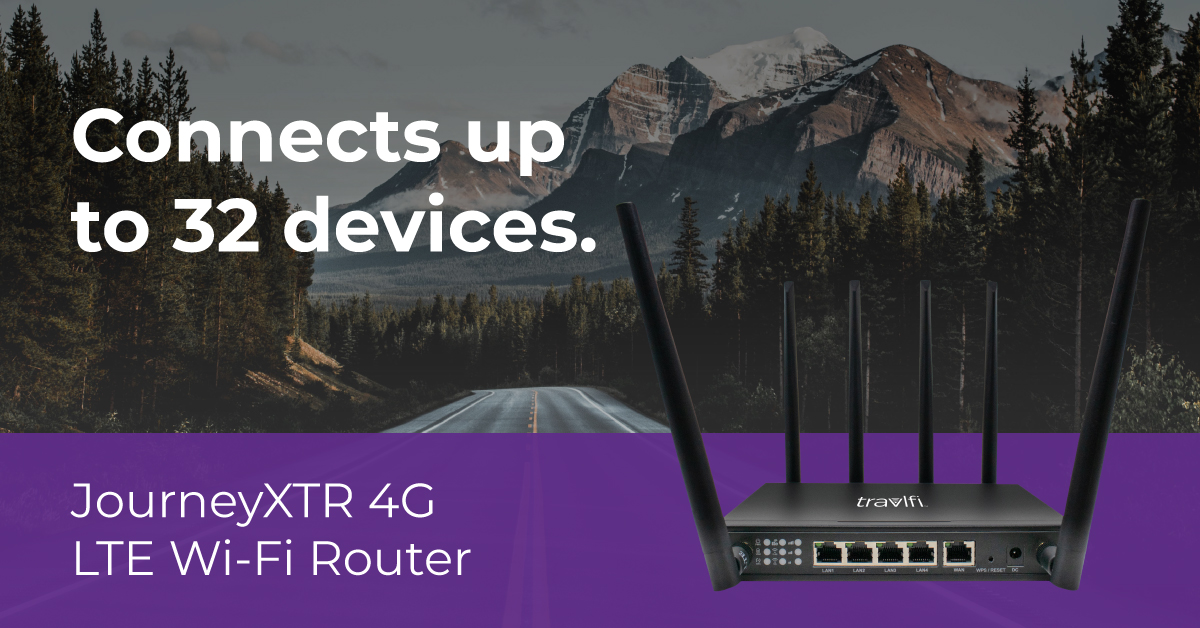
Pros of an RV WiFi Router:
- Wider range and coverage
- Supports multiple devices simultaneously
- Can connect to a mix of local WiFi and cellular networks
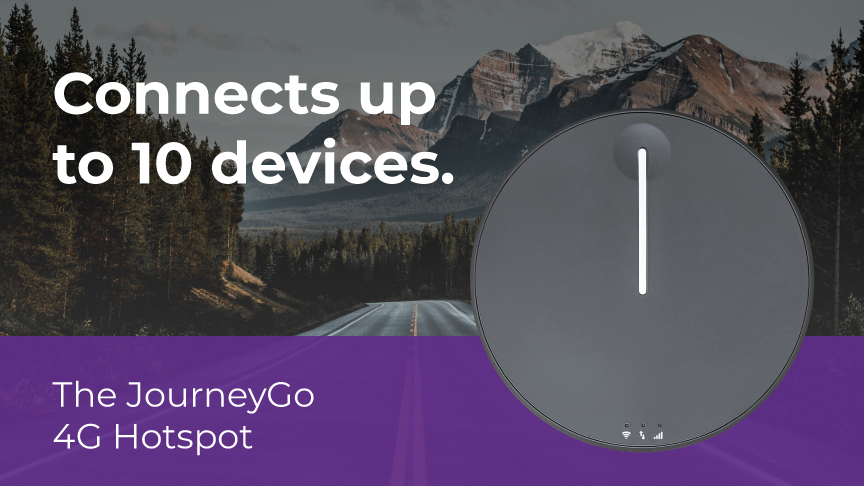
Pros of an RV WiFi Hotspot:
- Portable and easy to use
- Great for short trips or individual users
To understand the technical differences between 4G and 5G options for both hotspots and routers, check out our article on 4G vs. 5G: What's the Difference?.
Phone Hotspot vs. RV WiFi Hotspot
In the grand scheme of things, a cell phone hotspot and a dedicated mobile hotspot are both intended to achieve one thing: getting access to the internet. However, the way the two devices are used and designed is very different.
A cell phone hotspot is typically a feature found on your smartphone and uses the data provided by your network. A dedicated mobile hotspot is generally a separate device, like the TravlFi JourneyGo. As an RVer, you want your device to get internet in your RV whenever you need it. TravlFi hotspots use embedded SIM (ESIM) technology which brings you coverage where you need it most.
Embedded SIM technology allows the device to change towers so it can find the strongest cellular signal in your area and automatically connects to that signal because TravlFi has access to all major networks (at no additional cost)! So, unlike a cellular mobile hotspot, TravlFi allows you to benefit from more than one network, so you never have to be without high-speed internet access.
Here are some other things to consider:
- While the hotspot feature on your phone is a convenient solution in a pinch, it is not the primary purpose of your smartphone so the speeds and signal strength will typically be less than a dedicated hotspot.
- Most cellular plans that include hotspot data limit you to 10 to 15GB, so the capability is limited for a primary source of internet.
- Lastly, using the hotspot on your phone will drain the battery quickly, leaving you with a dead phone.
How to Get Internet in Your RV
Staying connected while on the road is no easy task. The life of an avid RVer can (and will) bring you to all kinds of places, some more forgiving than others. In general, lack of cellular coverage, data depletion, and simply not having an easy way to connect are all common challenges many RVers face, leaving them to sacrifice their ability to be connected to who and what they love when and wherever they want.
When considering the best way to stay connected while on the road, there are a few factors to consider:
- How often are you traveling?
- Are you traveling within or outside of the United States?
- What is it you are hoping to accomplish with your Wi-Fi?
- How many devices are you wanting to connect to?
A few common options for getting internet in your RV are connecting to a shared Wi-Fi at an RV park, using a cellular device hotspot, or using a mobile hotspot, like the Journey1 from TravlFi. Mobile WiFi routers, like TravlFi’s Journey XTR Pro 5G device, supports even stronger, faster, more reliable connections thanks to enhanced hardware.
Choosing the Best RV WiFi Router for Your Needs
When selecting an RV WiFi router, consider the type of internet access you need, the number of devices you want to connect, and the areas you plan to travel through. Some RV WiFi routers are better suited for rural areas, where cellular networks may be your only option, while others perform better in urban or suburban environments where public WiFi is more readily available.
What to Look for in an RV WiFi Router:
- Cellular compatibility: Ensure that the router supports the network of your chosen mobile carrier, whether it’s 4G or 5G.
- Signal boosting: Some routers come with built-in signal boosters, which can amplify weak signals from distant towers or WiFi sources.
- Number of devices supported: Choose a router that can handle the number of devices you plan to connect, including phones, tablets, laptops, and smart TVs.
- Durability: Since RV travel can be rugged, you want a router that's designed to withstand the wear and tear of life on the road.
For more creative ways to fund your travels and embrace life on the road, check out our guide on unique ways to fund your journey.
FAQs About RV WiFi Routers
What is RV WiFi?
RV WiFi refers to the technology that enables internet access in your RV, typically through a router or hotspot that connects to cellular networks or public WiFi. This allows you to use the internet for streaming, browsing, and working, even while traveling.
Can I use my home WiFi router in my RV?
While it's possible, a standard home router is not designed for the mobility or fluctuating signal strength you'll experience while traveling. RV-specific routers are better suited for picking up weak signals and handling the challenges of mobile internet.
Is RV WiFi fast enough for streaming?
Yes, many RV WiFi routers can provide fast enough speeds for streaming services, depending on the strength of the signal and whether you're using a 4G or 5G connection. To optimize your experience, consider a router with signal boosting features, or purchasing a separate signal booster.
How do I get internet access in remote areas?
In remote areas where public WiFi is unavailable, an RV WiFi router can connect to cellular networks. Ensure you have a router compatible with 4G or 5G, and consider a signal booster for better connectivity.
How much data do I need for RV WiFi?
This depends on your internet usage. If you plan to stream content or work online frequently, you may need an unlimited data plan or a high-data cap plan to avoid overage fees.
TravlFi Takeaways
- RV WiFi routers can provide better coverage and more consistent signal strength, and support more devices compared to a standard mobile hotspot.
- When choosing an RV WiFi router, look for features such as cellular compatibility, signal boosting, and the ability to support multiple devices.
- For remote areas, pairing a router with a signal booster can improve your internet experience.
Ready to upgrade your RV WiFi experience? Explore TravlFi’s mobile internet options and pay-as-you-go data plans.
More Essential Reading for Digital Nomads:
- The Best Small Towns for Digital Nomads in the US
- Best Digital Nomad Jobs in 2025 for RVers and Vanlifers
- Best Countries to Get a Digital Nomad Visa in
- How Digital Nomads Avoid Vanlife Burnout
- Complete Guide to Digital Nomad Health Insurance
Which TravlFi Device Is Right for You?
TravlFi keeps you connected on the road. Not sure which device is best for you? Compare below.

Article By: Amanda Capritto
Amanda Capritto is a fitness and outdoors journalist who travels full-time in a Winnebago camper van. Her work has appeared in national and global outlets like Lonely Planet, Reader's Digest, CleverHiker, CNET, and more.
